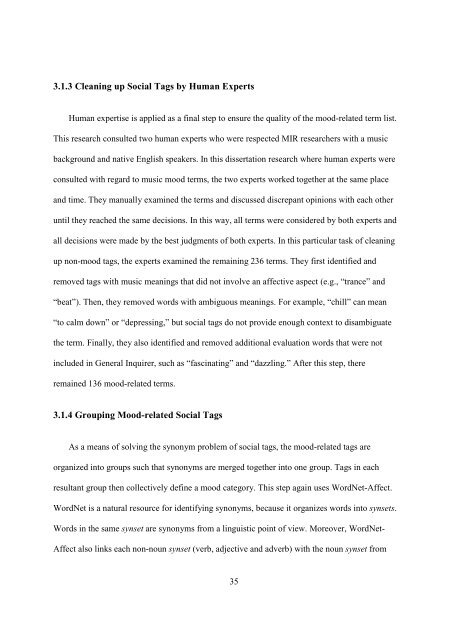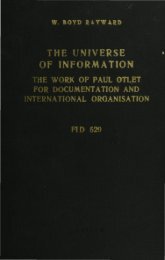improving music mood classification using lyrics, audio and social tags
improving music mood classification using lyrics, audio and social tags
improving music mood classification using lyrics, audio and social tags
You also want an ePaper? Increase the reach of your titles
YUMPU automatically turns print PDFs into web optimized ePapers that Google loves.
3.1.3 Cleaning up Social Tags by Human Experts<br />
Human expertise is applied as a final step to ensure the quality of the <strong>mood</strong>-related term list.<br />
This research consulted two human experts who were respected MIR researchers with a <strong>music</strong><br />
background <strong>and</strong> native English speakers. In this dissertation research where human experts were<br />
consulted with regard to <strong>music</strong> <strong>mood</strong> terms, the two experts worked together at the same place<br />
<strong>and</strong> time. They manually examined the terms <strong>and</strong> discussed discrepant opinions with each other<br />
until they reached the same decisions. In this way, all terms were considered by both experts <strong>and</strong><br />
all decisions were made by the best judgments of both experts. In this particular task of cleaning<br />
up non-<strong>mood</strong> <strong>tags</strong>, the experts examined the remaining 236 terms. They first identified <strong>and</strong><br />
removed <strong>tags</strong> with <strong>music</strong> meanings that did not involve an affective aspect (e.g., “trance” <strong>and</strong><br />
“beat”). Then, they removed words with ambiguous meanings. For example, “chill” can mean<br />
“to calm down” or “depressing,” but <strong>social</strong> <strong>tags</strong> do not provide enough context to disambiguate<br />
the term. Finally, they also identified <strong>and</strong> removed additional evaluation words that were not<br />
included in General Inquirer, such as “fascinating” <strong>and</strong> “dazzling.” After this step, there<br />
remained 136 <strong>mood</strong>-related terms.<br />
3.1.4 Grouping Mood-related Social Tags<br />
As a means of solving the synonym problem of <strong>social</strong> <strong>tags</strong>, the <strong>mood</strong>-related <strong>tags</strong> are<br />
organized into groups such that synonyms are merged together into one group. Tags in each<br />
resultant group then collectively define a <strong>mood</strong> category. This step again uses WordNet-Affect.<br />
WordNet is a natural resource for identifying synonyms, because it organizes words into synsets.<br />
Words in the same synset are synonyms from a linguistic point of view. Moreover, WordNet-<br />
Affect also links each non-noun synset (verb, adjective <strong>and</strong> adverb) with the noun synset from<br />
35
















